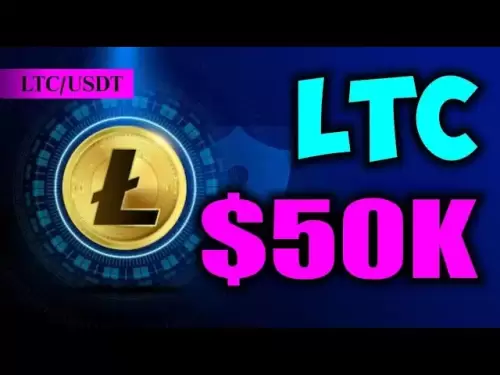-
 Bitcoin
Bitcoin $118000
-0.23% -
 Ethereum
Ethereum $3651
1.66% -
 XRP
XRP $3.423
-1.58% -
 Tether USDt
Tether USDt $1.001
-0.02% -
 BNB
BNB $742.8
0.69% -
 Solana
Solana $177.8
0.30% -
 USDC
USDC $0.9999
0.01% -
 Dogecoin
Dogecoin $0.2539
0.03% -
 TRON
TRON $0.3199
-1.74% -
 Cardano
Cardano $0.8382
0.59% -
 Hyperliquid
Hyperliquid $44.83
0.05% -
 Stellar
Stellar $0.4602
-1.49% -
 Sui
Sui $3.850
0.58% -
 Chainlink
Chainlink $18.62
2.56% -
 Hedera
Hedera $0.2681
0.97% -
 Avalanche
Avalanche $24.63
3.07% -
 Bitcoin Cash
Bitcoin Cash $522.5
0.96% -
 Shiba Inu
Shiba Inu $0.00001507
-0.80% -
 Litecoin
Litecoin $113.6
9.75% -
 UNUS SED LEO
UNUS SED LEO $8.994
0.24% -
 Toncoin
Toncoin $3.197
-0.43% -
 Polkadot
Polkadot $4.361
1.13% -
 Uniswap
Uniswap $10.45
1.41% -
 Monero
Monero $327.5
0.65% -
 Ethena USDe
Ethena USDe $1.001
-0.03% -
 Bitget Token
Bitget Token $4.992
-1.12% -
 Pepe
Pepe $0.00001355
0.67% -
 Dai
Dai $1.000
0.01% -
 Aave
Aave $322.6
0.15% -
 Bittensor
Bittensor $415.5
0.88%
Is an ETH ETF more secure than holding ETH on an exchange?
An ETH ETF offers exposure to Ethereum's price without owning the crypto, providing a secure, regulated way to invest through traditional brokerage accounts.
Jul 11, 2025 at 10:14 pm
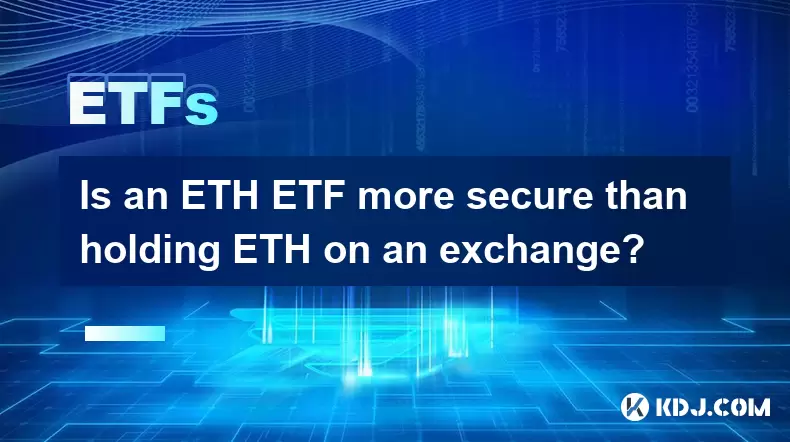
What is an ETH ETF?
An ETH ETF (Ethereum Exchange-Traded Fund) is a financial product that tracks the price of Ethereum without requiring investors to directly own the cryptocurrency. Instead, investors buy shares in the ETF, which are traded on traditional stock exchanges like any other equity. The fund itself holds Ethereum or derivative instruments that mirror its value.
The appeal of an ETH ETF lies in its accessibility and integration with traditional finance. Investors who may be hesitant to engage with cryptocurrency exchanges can gain exposure through their brokerage accounts. This structure eliminates the need for managing private keys or worrying about exchange security breaches.
Important: An ETH ETF does not grant ownership of actual Ethereum tokens.
Risks of Holding ETH on Exchanges
Storing ETH on an exchange exposes users to several risks, primarily related to custodial control and platform vulnerabilities. When you hold ETH on an exchange, you're essentially trusting the platform to safeguard your funds. However, history has shown that even large exchanges can suffer from:
- Hacks and cyberattacks
- Insolvency or mismanagement
- Regulatory shutdowns
In such cases, users may lose access to their funds entirely or face delays in recovering assets. Moreover, many exchanges do not offer insurance coverage for digital asset losses, leaving users financially exposed.
Important: Holding ETH on an exchange means you don't control the private keys.
Security Features of ETH ETFs
ETH ETFs are typically managed by institutional-grade firms with robust compliance frameworks. These funds often employ multiple layers of security, including:
- Custody solutions from regulated third parties
- Regulatory oversight and periodic audits
- Transparency in holdings and performance tracking
Since ETFs are listed on regulated exchanges, they must adhere to strict reporting standards. This regulatory scrutiny can provide an additional layer of investor protection compared to unregulated crypto exchanges.
Important: ETH ETFs are subject to financial market regulations and oversight.
However, it's crucial to note that while the fund may be secure, investors still carry market risk tied to Ethereum’s price volatility.
Control and Ownership Differences
One of the most significant distinctions between an ETH ETF and holding ETH directly is ownership. With an ETF, you do not own the underlying Ethereum tokens. You only own shares representing a claim on the fund's assets. This contrasts sharply with self-custody, where users have full control over their private keys and can transfer ETH freely.
For those prioritizing decentralization and autonomy, owning physical ETH stored in a personal wallet offers greater control. Conversely, an ETF appeals to investors seeking simplicity and familiarity with traditional investment vehicles.
Important: ETF investors lack direct access to blockchain-based utility or governance rights.
This distinction affects how users interact with decentralized applications (dApps), participate in network upgrades, or earn staking rewards.
Operational Steps: How to Access an ETH ETF
To invest in an ETH ETF, follow these steps:
- Ensure you have a brokerage account that supports ETF trading
- Search for available ETH ETF tickers (e.g., ETHW, ETHE)
- Review fund prospectus, expense ratio, and liquidity
- Place a buy order just like purchasing a stock
- Monitor performance through your portfolio dashboard
Unlike buying ETH on an exchange, there is no need to set up a wallet or manage crypto transfers. The entire process remains within the familiar framework of traditional investing.
Important: Always verify if the ETF is approved and regulated in your jurisdiction.
Some ETFs may trade at premiums or discounts relative to Ethereum’s spot price due to supply and demand dynamics.
FAQ: Common Questions About ETH ETFs vs. Exchange Holdings
Q1: Can I stake Ethereum held in an ETH ETF?
No, staking is not possible with an ETH ETF because you do not own the underlying ETH tokens. Staking requires possession of actual Ethereum and participation in the blockchain’s consensus mechanism.
Q2: Are ETH ETFs available globally?
Availability depends on regulatory approval in each country. Major markets like the U.S. and Europe may offer ETF options earlier than others. Always check local laws before investing.
Q3: Is it easier to liquidate ETH via ETF or exchange?
Liquidity varies based on market conditions. ETH ETFs are generally easy to sell during market hours, similar to stocks. In contrast, selling ETH on an exchange may involve withdrawal times and potential slippage depending on trading volume.
Q4: Do ETH ETFs pay dividends or interest?
No, ETH ETFs do not generate income like dividend-paying stocks. Their value fluctuates solely based on Ethereum’s price movements and fund performance.
Disclaimer:info@kdj.com
The information provided is not trading advice. kdj.com does not assume any responsibility for any investments made based on the information provided in this article. Cryptocurrencies are highly volatile and it is highly recommended that you invest with caution after thorough research!
If you believe that the content used on this website infringes your copyright, please contact us immediately (info@kdj.com) and we will delete it promptly.
- Dogecoin Price, Institutions, and the 2025 Prediction: A NYC Perspective
- 2025-07-20 22:50:12
- Subway Surfers: Unlock Characters, Master Tips & Tricks for Endless Fun
- 2025-07-20 22:50:12
- Bitcoin, Whales, and Binance: Decoding Market Moves
- 2025-07-20 22:30:13
- Bangladesh vs. Pakistan: T20 Showdown and Shifting Sands in Crypto
- 2025-07-20 22:30:13
- Bitcoin, America, Awakening: A New Era of Crypto Confidence?
- 2025-07-20 22:55:13
- Crypto Coins, Undervalued Gems & Bull Run Potential: What You Need to Know, New Yorker Style
- 2025-07-20 20:30:12
Related knowledge
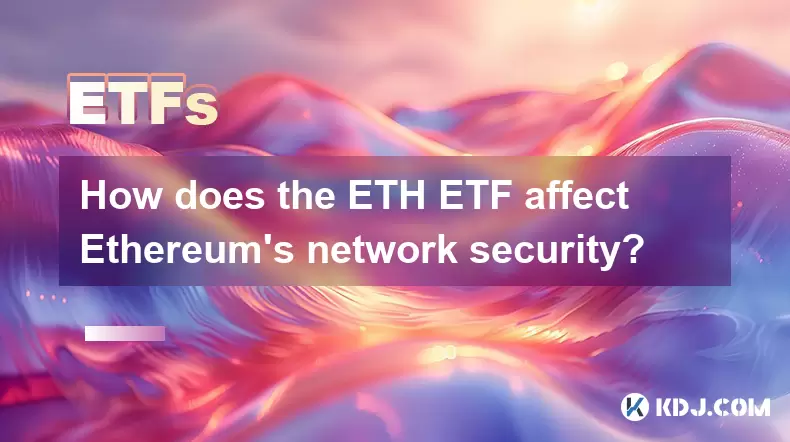
How does the ETH ETF affect Ethereum's network security?
Jul 17,2025 at 01:29pm
Understanding the ETH ETF ConceptAn Ethereum Exchange-Traded Fund (ETH ETF) is a financial product that allows investors to gain exposure to Ethereum ...
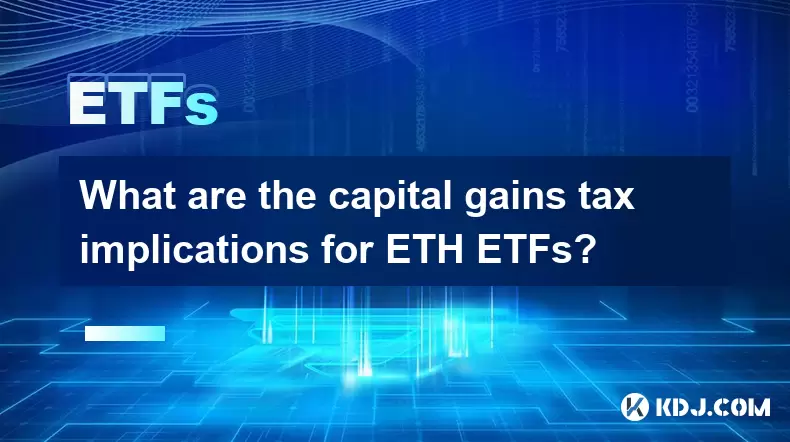
What are the capital gains tax implications for ETH ETFs?
Jul 18,2025 at 08:00am
Understanding Capital Gains Tax in Cryptocurrency InvestmentsCapital gains tax is a tax imposed on the profit realized from the sale of an asset that ...
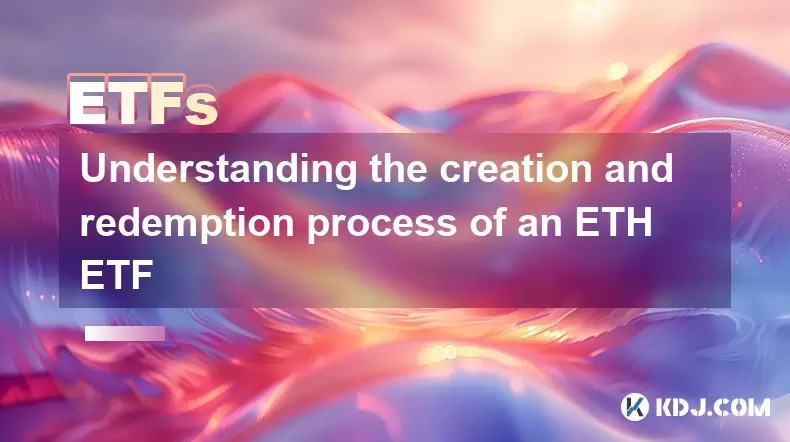
Understanding the creation and redemption process of an ETH ETF
Jul 19,2025 at 07:36am
What is an ETH ETF?An ETH ETF (Ethereum Exchange-Traded Fund) is a financial product designed to track the price of Ethereum without requiring investo...

How to analyze which ETH ETF is the best choice
Jul 19,2025 at 05:01pm
Understanding ETH ETFs and Their RelevanceEthereum Exchange-Traded Funds (ETFs) have emerged as a popular investment vehicle for those seeking exposur...
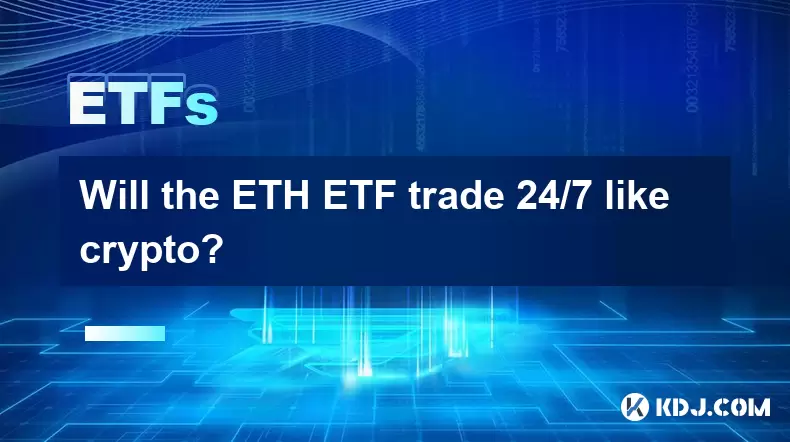
Will the ETH ETF trade 24/7 like crypto?
Jul 18,2025 at 10:00am
Understanding the ETH ETF and Its Trading HoursThe Ethereum Exchange-Traded Fund (ETH ETF) is a financial product that allows investors to gain exposu...
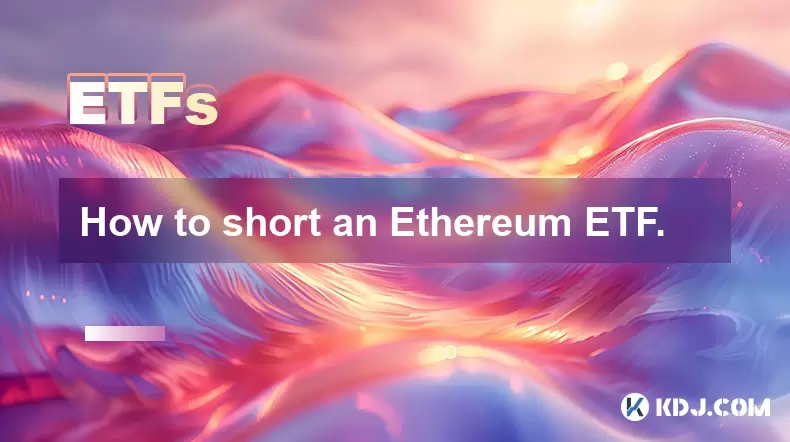
How to short an Ethereum ETF.
Jul 17,2025 at 05:43pm
Understanding the Concept of Shorting an Ethereum ETFShorting an Ethereum ETF involves betting against the price of Ethereum through a specific exchan...

How does the ETH ETF affect Ethereum's network security?
Jul 17,2025 at 01:29pm
Understanding the ETH ETF ConceptAn Ethereum Exchange-Traded Fund (ETH ETF) is a financial product that allows investors to gain exposure to Ethereum ...

What are the capital gains tax implications for ETH ETFs?
Jul 18,2025 at 08:00am
Understanding Capital Gains Tax in Cryptocurrency InvestmentsCapital gains tax is a tax imposed on the profit realized from the sale of an asset that ...

Understanding the creation and redemption process of an ETH ETF
Jul 19,2025 at 07:36am
What is an ETH ETF?An ETH ETF (Ethereum Exchange-Traded Fund) is a financial product designed to track the price of Ethereum without requiring investo...

How to analyze which ETH ETF is the best choice
Jul 19,2025 at 05:01pm
Understanding ETH ETFs and Their RelevanceEthereum Exchange-Traded Funds (ETFs) have emerged as a popular investment vehicle for those seeking exposur...

Will the ETH ETF trade 24/7 like crypto?
Jul 18,2025 at 10:00am
Understanding the ETH ETF and Its Trading HoursThe Ethereum Exchange-Traded Fund (ETH ETF) is a financial product that allows investors to gain exposu...

How to short an Ethereum ETF.
Jul 17,2025 at 05:43pm
Understanding the Concept of Shorting an Ethereum ETFShorting an Ethereum ETF involves betting against the price of Ethereum through a specific exchan...
See all articles

























